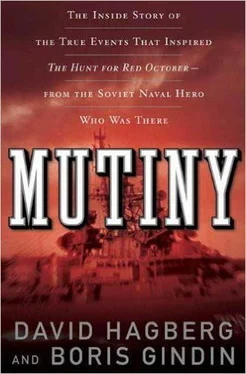But if it’s Sablin calling this meeting, then none of them have any choice but to snap to, like dutiful Communist sailors, and at least give the appearance of appreciating his lecture. The zampolit is the number-two officer aboard any Soviet warship. That means he answers only to the captain and no one else. And in political matters the zampolit is the supreme authority.
Curiously, the officers don’t particularly care for Sablin, but the sailors do, because this zampolit really listens and really seems to care about the welfare of the enlisted men. He’s an officer, but he’s sincere. The officers, however, who are educated, can tell the difference between being sincere and being genuinely brainwashed.
“Political classes were a fact of life,” Gindin says. “It felt foreign to us even though we’d been hearing the same things all of our lives. The lies we were being told never touched us, never got into our bones, never adhered to us. The classes were distant from reality, in a sense just another obligation.”
Most of the people aboard ship or in high school or in college felt stupid and degraded being forced to study this stuff.
Everybody knows it’s a lie.
But at the same time everyone lives the lie because it is the only life they know. “You believe in things,” Gindin says. “You are ready to put your life on the line for the ideals, and yet somewhere inside, maybe not consciously, but somewhere, you see things differently. But you can’t change things and you continue to live the way you are told to live.”
The story is that Sablin actually believes the Party line. He is an idealist who knows in his heart-of-hearts that a better life is just around the corner for all of them. If they just stick with the basic principles, if they just keep on working, keep trusting in Moscow, everything will work out fine.
“Hey, Boris, what the hell is going on?” Senior Lieutenant Oleg Sadkov wants to know. He’s the medical doctor and he’s just come up from the dispensary. He’s not much older than Gindin, maybe twenty-six, and is married with one daughter. Sadkov has never had a bad word to say about anyone—officers or enlisted—and everyone likes him because he’s easygoing, open, and honest. Besides that, he’s as skinny as a rail, and with his dark hair and thick mustache he looks like a teenager. No threat to anyone.
Before Gindin can answer, Senior Lieutenant Dimitry Smirnov comes out of his cabin with a deck of cards in his hand and a big grin on his face. He’s the chief navigator and commander of BCH-1 and normally keeps to himself, but this evening he’s just as puzzled as the other officers. Sablin’s called the meeting, Smirnov is sure of it, and he’s not going to give the prick the satisfaction of ruining everyone’s holiday.
Smirnov holds up the deck of cards. “Maybe we’ll have a game and the meeting will turn out okay after all.”
Eighteen officers, plus the captain, and eleven midshipmen are assigned to the Storozhevoy, but including the ones who were on duty at 1900, plus those few on leave, only the captain, eight officers, and four midshipmen are available for the meeting. None of them are happy.
“That’s okay with me,” Boris says. “But in two weeks I’m going to be home with my family. If that means sitting through a boring political meeting with our zampolit and earnestly enjoying what he has to say, that’s exactly what I’ll do.”
Of course nobody can disobey a direct order. Someone could call in sick, but Soviet naval officers do not operate that way. There’s the same sort of discipline in just about every navy. But there’s also the same sort of griping, including the Soviet navy.
“There’s no reason for this,” Captain Lieutenant Victor Vinokurov mutters half under his breath.
Gindin is near enough in the now-crowded corridor to hear this remark. “It’s Sablin.”
“Maybe so, but the captain has to give his approval for all meetings,” says Vinkurov, who is the commander of BCH-2 in charge of artillery. He’s a tall, blond guy, very strict with his officers. He wants to be captain of his own ship one day. “This is a holiday. There’s no urgency. Nothing has happened to cause such a meeting. It makes no sense, I tell you.”
It makes no sense to Boris, either, but an order is an order, and along with the other officers he heads forward to the midshipmen’s dining hall. It’s one of the largest compartments where the officers can gather on the entire ship. It’s on the port side, toward the bow, and right under the upper deck, on the opposite side of the ship from the Sekretka, the Secret Library where officers have to go to check out the classified documents, blueprints, and manuals for the weapons and equipment under their responsibility.
Once again Gindin is struck by how unnaturally quiet the ship seems. No engine noises, of course, because they are at a mooring, but there are no crewmen running around, making jokes, talking loudly, arguing perhaps. No officers are in their cabins now, the doors open, drinking spirt and telling stories or laughing or debating about something or playing chess, which sometimes can be loud.
Captain Lieutenant Nikolay Proshutinsky, who is in charge of the entire BCH-3 acoustic systems division, storms up the corridor from his cabin. He’s Kuzmin’s boss, and he slaps Sergey on the back.
“Eb tvoiu mat,” Proshutinsky says. It’s a uniquely Russian expression, which literally means “fuck your mother,” but it’s never used in that context. Instead, the phrase means that something is screwed up. Almost like the American GI expression FUBAR —Fucked Up Beyond All Recognition. Eb tvoiu mat, what the fuck is going on now?
“I don’t know, Lieutenant,” Kuzmin replies. He gets along well with his boss. “Maybe it’s Sablin going to give us a patriotic speech like last year.”
Proshutinsky is shaking his head ruefully. “Well, if that’s all it is, let’s not keep our good zampolit waiting.” He looks over at Gindin and grins. “Anyway, when we’re done Boris has invited all of us to his cabin for some spirt, isn’t that right?”
They come around a corner and straight ahead is the open door to the midshipmen’s dining hall. It’s this exact point in time that Gindin will remember for the rest of his life, though he doesn’t know it now, but he has developed a very bad feeling. One that he thinks he shares with the other officers. At that moment, for some reason he can’t know, he wishes that he could talk to his father for just a minute or two. Boris wants to ask for some advice. But even if he could somehow magically talk to Iosif, Boris wouldn’t know what to ask for.
Wherever his future lies, it’s just beyond the open door.
HOOK, LINE, AND SINKER
When the Bolsheviks took over Russia, one of the first things they did was rename the Imperial Russian Navy, calling it the RKKF— Raboche-Krest’yansky Krasny Flot, Workers’ and Peasants’ Red Fleet. Next it renamed most of the ships. And then almost nothing happened for fifteen or twenty years. Little or no money was given to build the navy, and the midshipmen graduating from the leadership and engineering schools languished in a fleet that had almost nothing to do.
Remember, it was the battleships Potemkin and Aurora and others that had supported the revolution, but Lenin’s new government, as idealistic and egalitarian as it was supposed to be, had a short memory.
And everyone in the world knew that the new RKKF was little more than a rust-bucket joke. During the negotiations of the Washington Naval Treaty right after WWI when the most powerful nations met to cap the size of the world’s navies to limit the possibility of another war, the Soviet Union was not invited to the table. It was a slap in the face that the new Communist government was completely ignored.
Читать дальше












